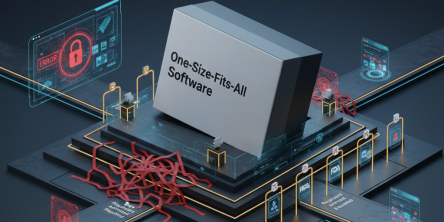Why Your Small Business Needs Penetration Testing

What is a penetration test?
In accordance with the official definition of the Payment Card Industry Security Standards Council (PCI SSC), the target of a penetration test is to"identify methods to exploit vulnerabilities to circumvent or defeat the security features of system components".
Penetration tests (or pentests, in short) are mimicked attacks in a controlled environment carried out by third-party security pros who employ the very same techniques as attackers located outside your infrastructure. The test will reveal if your servers or software will probably resist hostile attacks of course if the specified vulnerabilities often lead to further intrusion and manipulation.

Regrettably, cyber attacks will only have more complicated in the years ahead. As technology continues to scale up, cybercriminals can get more brazen and underhanded. If companies such as Target, Home Depot, or even Sony Pictures are vulnerable to such attacks, then small organizations have to seriously weigh the risks of culprits entering their websites.
To compensate and also counter-act the danger of an unsuccessful attack, it's essential that small organizations simply take preventative measures to make their infrastructure cyber-strong. Adopting best practices for cybersecurity within your business will probably go a long ways to preventing financial loss, new damage, and also other problems that accrue from a cyber attack.
There's one technique specifically that each small business needs to seriously consider. It's referred to as immersion testing. In brief, penetration testing has been an intentional attack on the computer system that is designed to identify security vulnerabilities that may potentially cripple your own infrastructure. It basically answers the following question:"What's your real-world effectiveness of my current security controls contrary to a busy, person, proficient offender?" Bearing this in mind, let's explore some good reasons your business should actively adopt comprehension testing as a best practice and include it into your cyber-security protocol.
1. Small companies are a target of Cyber Criminals
There's a multitude of data out there showing why small companies are particularly at risk of security hacks. According to some 2012 joint analysis by security firm Symantec and the National Cyber Security Alliance (NCSA), 83 percent of smaller enterprises usually do not have a formal cyber-security plan, and 69% are without even an informal plan. Yet another report states that 62 percent of breaches throughout 2013 were at the SME level. Yet another set of information shows that businesses with revenue under $100M actually cut security spending by 20% in 2014.
The most important thing is that SMEs are regarded as vulnerable because of the range of reasons like not enough focused on spending budget, the absence of risk awareness, and lack of employee training. Not to mention, within the last few years SMEs have grown a great deal more complex infrastructures that demand on-premise, cloud and mobile and interactive connections with customers and partners, that serve to generate a lot more vulnerabilities.

2. Data breaches cost more than a penetration evaluation
According to the most recent stats, cyber crime and Cyber Spying cost the US economy $100B a year and the global market approximately $300B annually. At the specific business degree, statistics reveal that the ordinary price of a hack for a U.S. company grew from $5.4 million in 2012 to $5.9 million in 2013, and the normal cost for each stolen or lost record containing sensitive and confidential information rose from $188 to $201per cent Including lack in company and brand damage connected to the security violation.
3. A data breach could Remove a little business
The impacts of a data breach might be devastating for your small business. A serious security breach might have irrevocable consequences which range from lost customers to trade damage, increased expenses and decreased revenue. According to the newest information, roughly 60% of small organizations who are hacked head out of business within 6 weeks. Those who do have the ability to remain afloat need to deal with the continuing issues of a tarnished brand. Here are some stats worth noting, courtesy of this site:
86 percent of people were"not in Any Way likely" or"not very likely' to conduct business with an organization which had endured a data breach between credit or debit card details
82% were"not in Any Way likely" or even"not very likely" to do business with a company which had endured a data breach involving a home address
80 percent were"not at all likely" or"not too likely" to Work with a company which had suffered a data breach between a telephone
76 percent have been"not in Any Way likely" or"not very likely" to do business with an organization which had endured a data breach between a Contact address
4. Penetration testing is insurance for your business
Having another set of eyes which may attentively identify their condition of your security infrastructure only makes good business sense. Penetration testing provides IT with a means to discover holes before a malicious origin does, identifies gaps in compliance (as an example, in case a certain apparatus wasn't properly patched), and also verifies what configurations have been already working or need to be reinforced. Moreover, it highlights the need for better worker safety training and preparedness.
If a penetration tester gets use of an own infrastructure without anyone raising a red flag then this will cause of concern. In general, penetration testing should be considered like insurance for your business. As one source well says, "Think of a Penetration Test as an annual medical physical. Even if you believe you're healthy, your physician will run a series of evaluations (some old and some fresh ) to find dangers that haven't yet developed symptoms."
Similar Articles
Not long ago, the idea of multiple AI agents working together, each with a specific role, collaborating to solve problems, felt like science fiction.
In today’s data-driven world, choosing the right business intelligence (BI) platform can make or break your organization's analytics success.
We all know that companies today are no longer limited to a single physical location. Work processes are also no longer strictly isolated.
It is neither secret nor news that the mind-boggling pace of digital transformation around us has totally altered consumer expectations.
In the world of finance, speed and accuracy are everything. Decisions made a day late can cost millions, and delayed visibility into financial performance can leave even the best organizations blind to risks.
Discover the best tools to enhance employee recognition, boost morale, and create a more motivated, engaged workplace culture.
At first glance, off-the-shelf software appears to be a dream come true. They are quick to set up, cheaper upfront, and marketed as “universal.”
A modern business must continually adapt. This bit everyone seems to know.
The modern healthcare industry is undergoing a significant transformation. The models of healthcare that we are used to thus far are now making way for a more data driven approach









